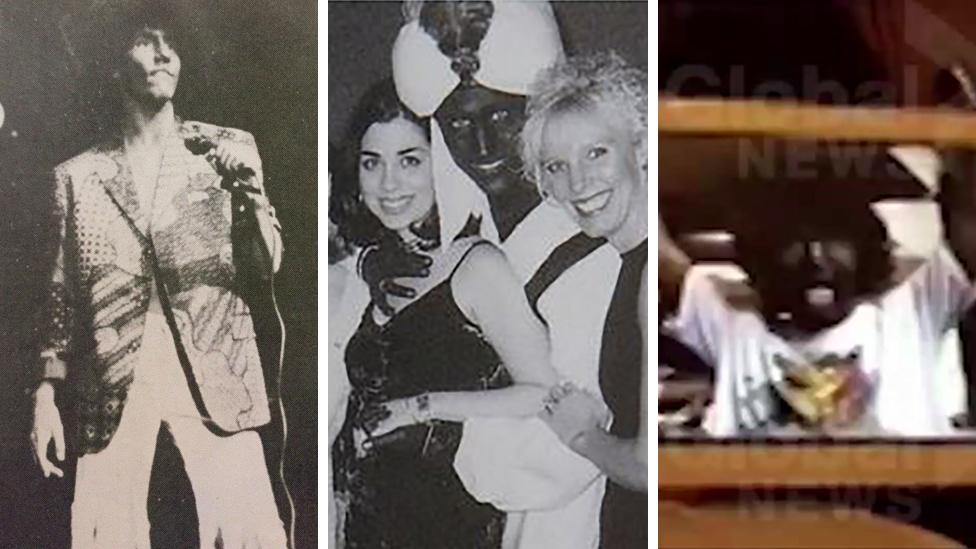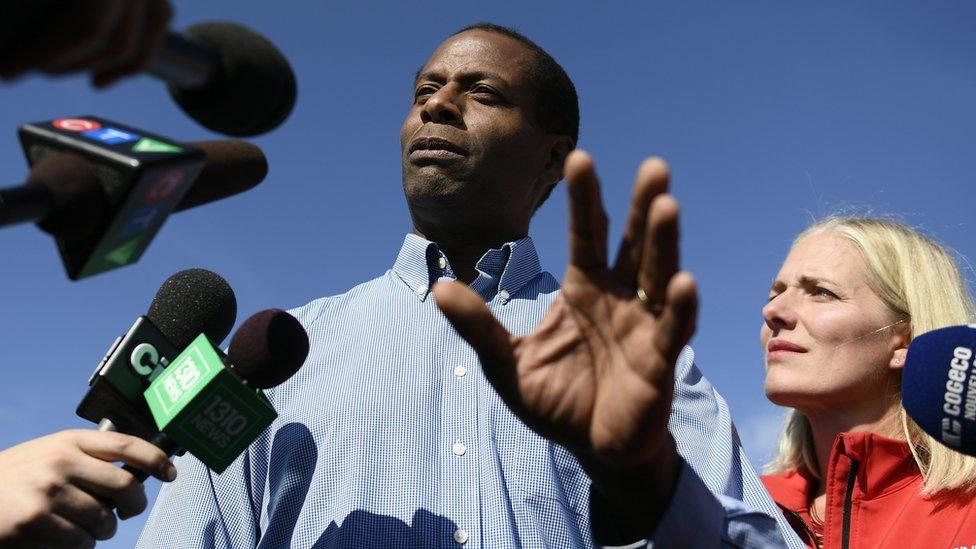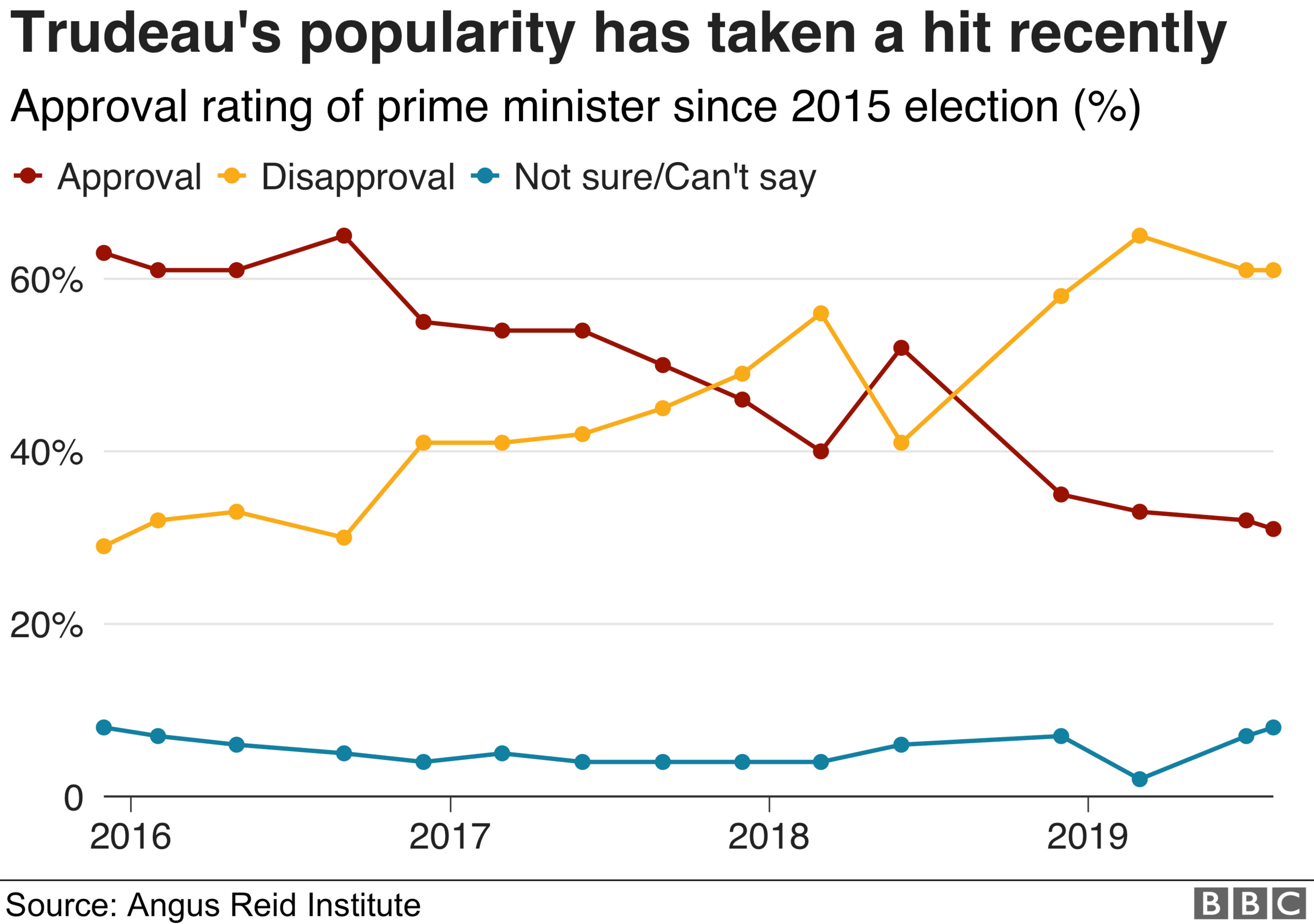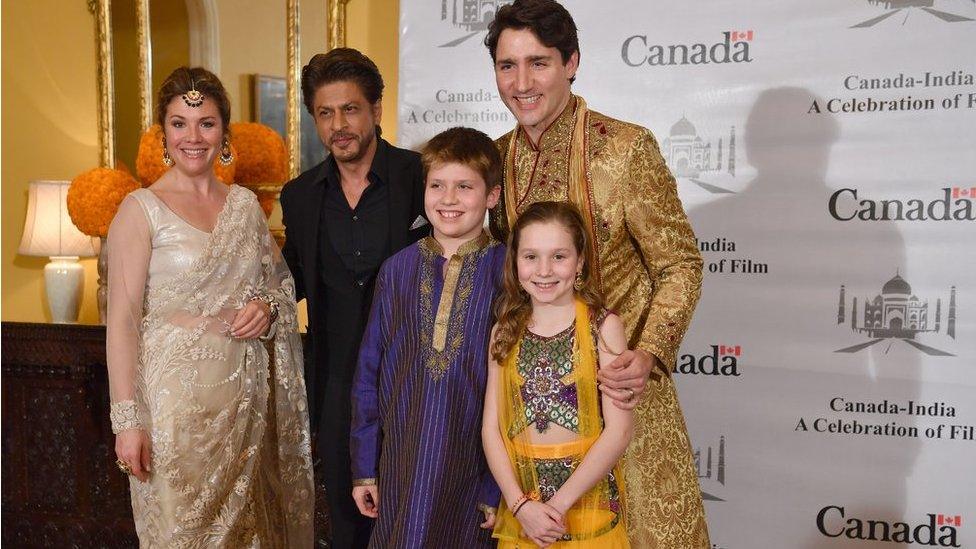How damaging is blackface scandal to Trudeau?
- Published
"Long time ago" - Canadians react to Trudeau brownface images
Three instances of Canadian Prime Minister Justin Trudeau wearing blackface or brownface - widely accepted as racist caricatures - have landed like a bombshell in the Canadian election campaign. What does this mean for his chances of winning?
A contrite Justin Trudeau admitted that he never told anyone about his history of dressing in blackface or brownface - not even the Liberal party members first vetting his candidacy.
In his lengthy second mea culpa since the scandal broke, he said he was too embarrassed about the incidents to raise them with anyone. He also conceded that he couldn't rule out more instances coming to light, noting he had no recollection of one of the occasions now in the public domain.
Mr Trudeau said at the time, he didn't understand the hurt his actions could cause, because of "the layers of privilege that I have".
Shachi Kurl, a pollster with the Angus Reid Institute, called the release of the images and footage a "massive cannonball" that could strike at the core of Mr Trudeau's brand.
A new opinion survey published on Thursday by the institute, external suggest Canadians see his top attributes as tolerance and compassion.
"Justin Trudeau's brand to this point - until today - has been unassailable on the question of tolerance and pretty unassailable on the question compassion," she told the BBC.
"He has a very large base of goodwill on those issues."

Three instances of Trudeau in blackface:
First photo is from 2001, when he was a 29-year-old teacher at a school in Vancouver and was attending an Arabian Nights- themed gala
Second is from when he was performing in a talent show as a student at high school
Third is video footage from the early 1990s, when Mr Trudeau would have been in his late teens or early 20s

She notes this is a second real hit to Mr Trudeau that could shatter his cultivated political image.
The SNC-Lavalin affair, a political crisis related to attempts to pressure a former attorney general to cut a deal for a firm facing a corruption trial, saw his popularity drop sharply in the polls earlier this year.
Liberal support dropped below the support for the Conservative Party at the time.
Ms Kurl says in recent weeks, progressives and centre-left voters have been slowly rallying back around Mr Trudeau and the Liberals. This incident could reverse that trend, she says.
That backing could move to other parties on the left - the NDP or the Greens - or leave voters undecided.
The questions Ms Kurl is asking are: "Do they stay with Mr Trudeau or do they scatter? Can they pull they back together again or is it too late?"

The three Trudeau images
It could also alienate a key demographic for Mr Trudeau - younger voters.
"The second question is what is the impact on voter suppression," she said. "Does this turn off young voters and then have them just stay home?"
Kevin Bosch is a former deputy director of the Liberal Research Bureau, during which time he provided strategic research and advice to Liberal leaders including Mr Trudeau.
Mr Bosch said that while this will definitely knock the Liberal campaign off track for a few days, "I don't think it'll be fatal for Trudeau".
He said that Mr Trudeau has built up enough goodwill over the last four years as a vocal supporter of a multicultural Canada.
"This could have been very damaging to Trudeau - if it came in 2015," he said. "When you've been a prime minister for a period of time, voters tend to focus on your record in government."
He said if it had come out in the last election - when voters did not know Mr Trudeau as they do now - it might have collapsed the Liberal campaign and changed the eventual outcome: a Liberal majority.
Like Canada, the Liberal Party is diverse.
Before the story broke and throughout the following day, Mr Trudeau was busy contacting many minority Liberal candidates as well as various community leaders, offering apologies for his actions.
Liberal candidate Greg Fergus, who is black, told journalists in Ottawa that he was contacted on Wednesday night by Mr Trudeau, CTV News reported, external.
"There was a lot of confusion and hurt last night by the black community," he said, but added that Mr Trudeau had built up a good "track record" within the community. "I will say this to all of you, I don't believe that anybody has ever lived their lives without making errors," he said.

Liberal candidate Greg Fergus - who is also chair of the black caucus in Parliament - speaks to reporters
Liberal candidate Randeep Sarai says he was "saddened" when the photos emerged. "For me, it's difficult to understand," he tell the BBC.
"The person in those photos from 20 years ago isn't the person that I've worked with the last four years. He has an impeccable record on promoting diversity, calling out intolerance and breaking down the barriers in this country for people who look like me."
He said he has accepted Mr Trudeau's apology.
We have yet to see how the election polling - which has had the two main parties neck and neck- is affected by this crisis.
But the Canadians that the BBC spoke to on the streets of Toronto and Ottawa on Thursday were mostly unmoved by the news.
It's a non-issue, said one, in sentiments that were echoed by others.

Prof Cheryl Thompson has studied the phenomenon of blackface in Canada, and she calls it "as Canadian as hockey".
While the genre of performance began in the US, she says, it was part of Canadian culture by the mid-1800s.
"The only difference [between Canada and the US] is that we haven't had a culture where we contend with race in terms of our national discourse," she says.
Prof Thompson says this incident is an opportunity to address "a knowledge gap" about Canada's own history.
"There is something about our culture that we are now being forced to confront in ways that we haven't been asked to confront before."
On a personal level, Prof Thompson, who is black, says that as a longtime Liberal voter the images have given her pause.
"How can I vote for someone who doesn't seem to understand who I am as a person?
"And I just think Justin Trudeau, for all the stuff that he says, I don't think understands black and brown people as much as he says that he does."
- Published18 September 2019

- Published22 February 2018

- Published12 September 2019
